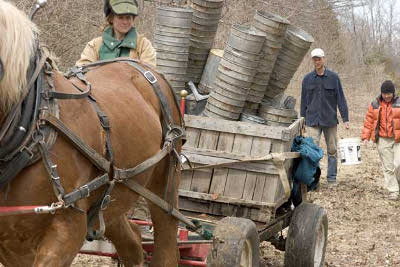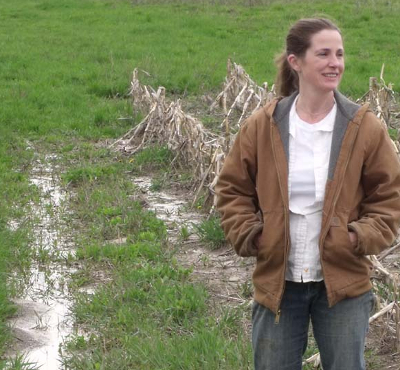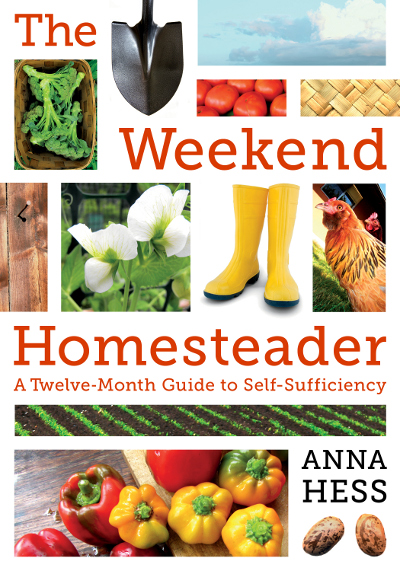
"Building a wildly complex farm all at once"
 "A farm is a manipulative
creature. There is no such thing as
finished. Work comes in a stream and has no end. There are
only the
things that must be done now and the things that can be done
later.
The threat the farm has got on you, the one that keeps you running from
can until can't is this: do it now, or some living thing will wilt or
suffer or die. It's blackmail really."
"A farm is a manipulative
creature. There is no such thing as
finished. Work comes in a stream and has no end. There are
only the
things that must be done now and the things that can be done
later.
The threat the farm has got on you, the one that keeps you running from
can until can't is this: do it now, or some living thing will wilt or
suffer or die. It's blackmail really."In The Dirty Life, Kristin explains how she and her husband-to-be spent their first year "building a wildly complex farm all at once." Mark (hers, not mine) had the vision of creating a CSA that provided a full diet, from meat and dairy to grains and vegetables...and he wanted it up and running by August. Since the duo only moved onto the farm that winter and planned to work the ground using draft horses, they faced extremely long, back-breaking days to make their dream a reality.
 One of the hardest lessons I've learned on
our homestead is the issue of pacing. You can see throughout The
Dirty Life how
biting off nearly more than they could chew stressed Kristin and Mark
almost to the breaking point, and the quote at the top of this post
explains why it's so hard to scale back your vision once you've started.
One of the hardest lessons I've learned on
our homestead is the issue of pacing. You can see throughout The
Dirty Life how
biting off nearly more than they could chew stressed Kristin and Mark
almost to the breaking point, and the quote at the top of this post
explains why it's so hard to scale back your vision once you've started.Eventually, Mark and Kristin settled on a "no-farming-on-Sundays rule", but they could have saved a lot of heartbreak if they'd been less ambitious from the get-go. Kristin wrote about an early winter blizzard-turned-planning-day:
"We spent the day in a fit of joyful
enthusiasm, mapping out the next year of work.... We filled in
the days and weeks with our ambitions, which even then we must have
known were too big to be contained in the boundaries of a single
year. The first week in February was reserved to FIGURE OUT
GREENHOUSE---BUILD IT! In the second week of that month, we would
aim to BUILD DISTRUBUTION AREA and also, somehow, cut and split the
next year's FIREWOOD. The day in October when we planned to get
married Mark had written WEDDING, and below that, on the same day's
square, 50 CHICKS ARRIVE.... The following week he had written
HONEYMOON and also, neatly, EXTRACT HONEY FROM THE HIVE."
Of course, the obvious take-home message is "don't marry a Swarthmore graduate" --- I suspect Kristin's Mark and I have more in common than our overambitious plans, and we do make tough spouses. But if teaming up with a Swattie wasn't in the cards anyway (or if it's too late to back out now), I think even folks homesteading on a small urban lot should think twice about how much time they really have when planning the year's garden and selecting starter livestock. My new rule of thumb is to figure everything will really take at least twice as long as I think it will, which pads our schedule against inevitable emergencies and lowers my stress levels considerably.
For those of you who have been homesteading a while, did you bite off more than you could chew during year one? And, for everyone, what strategies have you used to lower your ambitions down to realistic levels?
Those of you new the book club might want to check out last week's post about part one of The Dirty Life. We'll be discussing part three next Wednesday, and my copy of the book is now up for grabs --- whoever emails me first gets it. (Congratulations, Irma! You're the winner.)
Meanwhile, I wanted to give you a heads-up so you could hunt down the next book club read in a timely manner. "Radical Homemakers is about men and women across the U.S. who focus on home and hearth as a political and ecological act, and who have centered
 their lives around family and
community for personal fulfillment and cultural change. It explores
what domesticity looks like in an era that has benefited from feminism,
where domination and oppression are cast aside and where the choice to
stay home is no longer equated with mind-numbing drudgery, economic
insecurity, or relentless servitude." We'll start discussing on
August 29, which should give you plenty of time to hunt down the book
on interlibrary loan.
their lives around family and
community for personal fulfillment and cultural change. It explores
what domesticity looks like in an era that has benefited from feminism,
where domination and oppression are cast aside and where the choice to
stay home is no longer equated with mind-numbing drudgery, economic
insecurity, or relentless servitude." We'll start discussing on
August 29, which should give you plenty of time to hunt down the book
on interlibrary loan.My paperback includes three chapters not found in the original ebooks, all of which focus on less hands-on lessons like pacing.
Want more in-depth information? Browse through our books.
Or explore more posts by date or by subject.
About us: Anna Hess and Mark Hamilton spent over a decade living self-sufficiently in the mountains of Virginia before moving north to start over from scratch in the foothills of Ohio. They've experimented with permaculture, no-till gardening, trailersteading, home-based microbusinesses and much more, writing about their adventures in both blogs and books.
Want to be notified when new comments are posted on this page? Click on the RSS button after you add a comment to subscribe to the comment feed, or simply check the box beside "email replies to me" while writing your comment.

That sounds like me - although I am only trying to re-create my suburban sized yard/house into massive food-garden and, with a budget of $0, trying to make my 60 year old tract home into something unique and beautiful while raising my twin 7.5 year olds in a simple life while I work from home and consider homeschooling.....
While I am ripping out palm tree weeds I am eyeing the other side of the yard for the ten things that I 'should' be doing at the same time like ripping out a concrete pad, building a chicken coop, digging the trench for drip-irrigation. At the same time I am doing that I am making snacks, transferring loads of laundry, reading fairy tales and building "forts.
I should be able to get it all done this week.
Self-care is a must if a farm is to be sustainable.
We just implemented "Laundrymat Hours" for food processing. I have a day job, and had been staying up far too late preserving. With laundrymat hours, the last canning project starts no later than 9:00 PM, and we try to wrap up all cooking by 10:00 PM.
That is the sound of me laughing, only somewhat maniacally. "Biting off more than one can chew" is more or less the story of my life . . . and I still haven't learned proper pacing. Things always take less time in my head than they do in reality, from planting a garden to cooking dinner to sewing a dress or a toy. About the only things that take less time than I'm expecting are reading books (Walden being the exception that proves the rule, of course) and writing (assuming I'm in the groove). But I'm always so in love with my dreams of what COULD be, that I have a dreadful time trying to pare things down to what actually CAN be, given the amount of time I've got to use. If you aren't naturally good at pacing, learning it on your own can be very tough.
On a side note, my first thought upon reading the first quote - "a farm is a manipulative creature," was that it also applied quite well to an old house. There really is no end to the work (although at least, for the most part, one doesn't have to worry about living things wilting and/or dying if one doesn't do something in an old house . . . catastrophic plumbing failures, on the other hand, are almost guaranteed). Of course, for those of us trying to restore an old house and start a suburban homestead at the same time . . . well, we're just crazy and it's probably best to leave it at that!
Reading about their ambitions for the farm and CSA made me completely exhausted. Perhaps if I was still in my 20's though I'd have tried something like that
Ever since I was little my Mom would kid me about biting off more than I could chew, and I am worst in the garden (love my seed catalogs!) What has mostly cured me is seeing things go to waste because I could not get to them. Eventually I came up with rules/guidelines for how much to plant each year and things are working alot better.
BTW, I read the whole book very quickly, enjoyed it alot!
De --- I know what you mean --- it wore me out to read it too!
Roland --- Excellent tips! The only thing I'd add off the top of my head that's more specific to homesteading is that dealing with emergencies and broken things can take 20% to 50% of your week, so plan on that.
For us it wasn't so much that we bit off more than we could chew, but rather that we never had a good clear long term plan, or when we did, the plan would change. I feel like we spent 3 years putting time, money, and energy into plans that later changed. We have moved fences, rebuilt shelters, changed livestock choices. In general we have redone so much, rather than making forward progress.
The Essex farm plan seemed so irrational and impossible to me - and yet I realized when reading the book that as irrational as it seemed, they did it. They aren't still spinning their wheels redoing the same projects over and over.
We also instituted the no farm work on Sundays, our second year on the farm.
Overall in this section, I was impressed with how lazy I am. I do not work nearly as hard as I could, or should, around here. Farming is not a full time job for us, nor is it much of our income, allowing us to be a bit more slack. And I've always been against a milk cow, or even milking the goats (more than stealing some milk here and there when the babies are nursing) because I do not want to be tied down to a milking schedule. We get our milk straight from the dairy (neighboring farm) but it is "commercial" (Holstein) milk - after reading this book, I'd love to try milk from a free range jersey cow.